Archive for the ‘Current Events’ Category
Tuesday, December 22nd, 2009

I was deeply saddened upon learning that my dear friend Mrs. Ann Nixon Cooper had passed away at her home on Monday evening.
I first became acquainted with Mrs. Cooper in 1996, when she was 94 years young through my genealogical research on Wessyngton Plantation, which she also had family ties to.
Mrs. Cooper was a very beautiful person and I treasured our friendship over the years. She was always very loving and kind when I visited her and also very helpful in providing me with information.
Mrs. Cooper lived a very long, productive and interesting life. I loved to listen to stories about her childhood in Tennessee and her adult life in Atlanta. She was so sharp it was hard to believe that she was more than 100 years old.
Mrs. Cooper became known worldwide last year when CNN television news chronicled her voting early for then Senator Barack Obama.
Although Mrs. Cooper became well known for voting for President Obama, she led a very interesting life before then which is told in her forthcoming book A Century and Some Change: My Life Before the President Called My Name.
I will truly miss my dear friend.
With Love,
John
Tags:A Century and Some Change, Ann Nixon Cooper, Atlanta Georgia, Barack Obama, CNN News, Don Lemon, Huffington Post, John Baker, Karen Grisby Bates, Michelle Obama, My Life Before the President Called My Name, New York Times, President Obama, Washington family, Washington Post, Wessyngton Plantation, Yes We Can
Posted in Civil War, Current Events, Genealogy & DNA, Interviews, Introduction & Personal, Plantation Life, Research | Comments Closed
Monday, November 30th, 2009
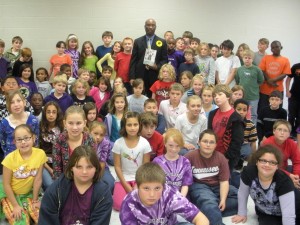
5th Grade Class at Gateview Elementary in Portland, TN
On November 20th I had the honor of delivering a presentation about my book The Washingtons of Wessyngton Plantation to the entire fifth grade class at Gateview Elementary School in Portland, Tennessee. More than 100 students attended. Prior to my visit the students had studied the Civil War, which tied into my program. The students were very attentive and had many questions. Following the presentation many of the students expressed an interest in tracing their genealogy.
Tags:Civil War, Gateview Elementary School, Genealogy & DNA, history, Portland Tennessee, Tennessee history
Posted in Book Tour & Reviews, Civil War, Current Events, Genealogy & DNA, Interviews, Introduction & Personal, Plantation Life, Research | Comments Closed
Tuesday, November 24th, 2009
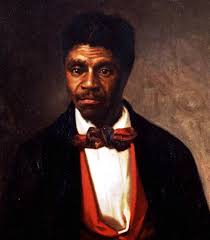
In 1847 an enslaved African American, Dred Scott, went to trial to sue for his freedom. This case, which later became known as Dred Scott v. Sanford, impacted the citizenship of all African Americans throughout the United States.
Dred Scott was born a slave in Southampton County, Virginia and was owned by Peter Blow. Peter Blow was the great-nephew of Colonel Michael Blow who owned my ancestors before they were brought to Wessyngton Plantation by Joseph Washington.
Scott was taken to Alabama by the Blow family and later to St. Louis. After Peter Blow’s death in 1832, Scott was bought by an army surgeon Dr. John Emerson who took him to Illinois and the Wisconsin Territory.
Scott’s stay in Illinois and Wisconsin, where slavery was prohibited, gave him the legal standing to make a claim for his freedom. The abolitionists encouraged him to sue for his freedom. The case and appeals took ten years. In March 1857, the United States Supreme Court declared that all blacks, slaves as well as free blacks, were not, and could never become, citizens of the United States.
The decision was a victory for southern slaveholders, while northerners were outraged at its outcome. The Dred Scott case influenced the nomination of Abraham Lincoln to the Republican Party and his election that led to the South’s secession from the Union and ultimately the freedom of all African Americans.
Peter Blow’s sons, who had grown up with Dred Scott, helped him pay the legal fees for his lengthy case. After the Supreme Court’s decision, they purchased Scott and his wife and then emancipated them.
Dred Scott died nine months later—a free man.
.
Tags:Abraham Lincoln, Blow Family, Civil War, Confederate States, Declaration of Independence, Dr. John Emerson, Dred Scott, Dred Scott Decision, Frederick Douglass, Free Territory, Joseph Washington, Michael Blow, Missouri Compromise, Peter Blow, Runaway Slave Law, Scott vs. Sanford, Slave Laws, Southampton County Virginia, St. Louis, Supreme Court, Union Army
Posted in Civil War, Current Events, Genealogy & DNA, Interviews, Introduction & Personal, Plantation Life, Research | Comments Closed
Tuesday, November 17th, 2009

On Tuesday November 4, 2008, President Barack Obama reflected on the life of Mrs. Ann Nixon Cooper: “she’s seen throughout her century in America─the heartache and the hope; the struggle and the progress; the times we were told we can’t; and the people who pressed on with that American creed: Yes, we can.”
Empowered and energized by this history-making presidential campaign, Mrs. Cooper told her story in her own voice. A Century and Some Change is the portrait of an American who lived a rewarding and culturally rich life.
Mrs. Cooper was raised in Nashville in the home of her aunt-in-law Joyce Washington Nixon, who was born a slave at Wessyngton Plantation during the last days of the Civil War. I had the honor of interviewing Mrs. Cooper and recording her memories in my book The Washingtons of Wessyngton Plantation, which she mentioned in her book.
A Century and Some Change: My Life Before the President Called My Name will be released on January 5, 2010 by Atria Books, a division of Simon & Schuster. Mrs. Cooper passed away on December 21st at her home, nineteen days short of her 108th birthday.
Order A Century and Some Change by clicking the icon of her book cover
Tags:A Century and Some Change, Acceptance Speech, Al Cooper, Albert Berry Cooper II, Allen Berry, Andrew Young, Ann Nixon Cooper, Atlanta Georgia, Atria, Atria Books, Barack Obama, Before the President Called My Name, Berry Family, Bessie Dozier, Book: A Century and Some Change, CNN, Cooper Family, Coretta Scott King, Don Lemon, Elmwood, First Lady Obama, Frank Berry, George Washington, Granville Washington, Irene Nixon, Irene Washington, James Dozier, Jerry Nixon, John Baker Jr., Joyce Cooper Bobo, Joyce Washington Nixon, Karen Grigsby Bates, Martin Luther King Jr., Meharry, Michelle Obama, Nashville Tennessee, Nixon Family, Obama family, President Barack Obama, President Obama, President Washington, Presidential campaign, Presidential Election, Simon & Schuster, Stories of My Family's Journey to Freedom, W. W. Berry, Washington family, Washingtons of Wessyngton Plantation, Wessyngton Plantation, Yes We Can
Posted in Book Tour & Reviews, Civil War, Current Events, Interviews, Introduction & Personal, Plantation Life, Research | Comments Closed
Tuesday, November 10th, 2009
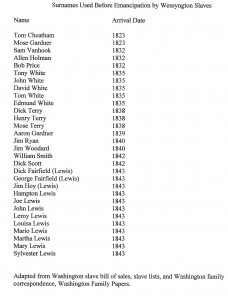
Surnames of Wessyngton Slaves
Slaves were usually known by their first names, especially on small farms with few slaves. Plantation owners rarely recorded their slaves with surnames unless they had several individuals with the same first names. For that reason the use of surnames by slaves was far more common on large plantations where more people were likely to have the same given names.
Due to Wessyngton Plantation having such a large enslaved population many African Americans are listed with their previous owners’ surnames as early as the 1820s.
Slave bills of sale and other documents in the Washington Family Papers collection details the origins of many of these African American families.
The list above documents the names African Americans on Wessyngton Plantation who used surnames prior to emancipation and the date of their arrival on the plantation.
Tags:African American History, African American Surnames, African Slavery, Day Names, Given Names, Naming Patterns, Naming Practices, Plantation Records, plantation slavery, Slave Bills of Sale, Slave Names, Slave Surnames, slave trade, Tennessee slavery, United States slavery, Virginia Slavery
Posted in Civil War, Current Events, Genealogy & DNA, Interviews, Introduction & Personal, Plantation Life, Research | Comments Closed
Sunday, November 8th, 2009
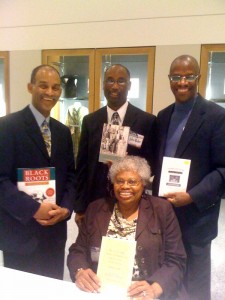
Meet the Authors event, International Black Genealogy Summit
I just returned from a very exciting event—The first International Black Genealogy Summit held in Ft. Wayne, Indiana on October 29-31, 2009. Several hundred people participated. Throughout the conference I shared my research experience with genealogists. It was wonderful to speak with many people who had already read my book. The give and take of ideas illustrates that we are just at the beginning of a long and interesting journey to learn about our roots.
At the Meet the Authors event everyone could talk to the authors of books related to African American genealogy. The authors posed together for this photo. (L-R) Tony Burroughs who wrote Black Roots: A Beginners Guide To Tracing the African American Family Tree; myself; Tim Pinnick, author of Finding and Using African American Newspapers; and (Seated) Frazine Taylor, with her book Researching African American Genealogy in Alabama.
Tags:African American Genealogy, African American Newspapers, Alabama Genealogy, Black Roots, DNA Testing, family history, family research, family tree, Frazine Taylor, Genealogical Research, Genealogy and DNA, International Black Genealogy Summit, Tim Pinnick, Tony Burroughs
Posted in Book Tour & Reviews, Current Events, Genealogy & DNA, Interviews, Introduction & Personal, Plantation Life, Research | Comments Closed
Sunday, October 18th, 2009
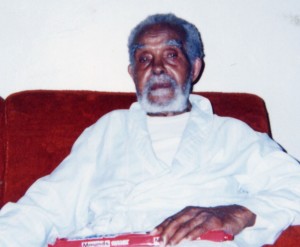
Joseph Washington 1895-2002
In more than thirty years of researching my ancestry and the lives of African Americans enslaved on Wessyngton Plantation, I have had the honor of interviewing more than twenty individuals whose parents or grandparents lived on the plantation. These individuals ranged in age from eighty to 107 years old.
Although I found hundreds of documents about my ancestors from plantation records written by the owners of Wessyngton, I learned many personal things about my ancestors from conducting interviews with elder family members.
In 1994, I visited my cousin Joseph Washington 1895-2002 (pictured above) at his home in Mansfield, Ohio on his one hundred second birthday. As a child Joseph lived next door to my great-great-grandparents Emanuel and Henny Washington who were born at Wessyngton in the early 1800s. He related many stories about them to me including ghost stories that my great-great-grandfather used to tell all the children on the plantation and songs he used to sing. Joseph told me what life was like on the plantation when he grew up there and how many people on the plantation were related to one another.
Oral history is a vital key to tracing African American genealogy and provides many details about our ancestors that can’t be found in records.
Tags:African American History, African American Oral History, African American slavery, Black Genealogy, black history, Civil War, family history, Griot, Interviews, Joseph Washington, Oral History, Oral Tradition, plantation slavery, Plantations, Tennessee history, Tennessee slavery
Posted in Civil War, Current Events, Interviews, Plantation Life, Research | Comments Closed
Tuesday, August 4th, 2009
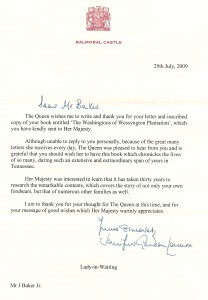
Letter from Queen Elizabeth
Queen Elizabeth acknowledged the receipt of a signed copy of my book. As is the custom, her lady-in-waiting wrote me. The royal seal indicated that the Queen was at her summer residence, Balmoral Castle in Scotland.
http://en.wikipedia.org/wiki/Balmoral_Castle– for your info.
Tags:African American History, Balmoral Castle, Buckingham Palace, Civil War, Genealogical Research, President Washington, Queen Elizabeth, Royal Family, Slavery, Tennessee history, Washington family
Posted in Civil War, Current Events, Genealogy & DNA, Interviews, Introduction & Personal, Plantation Life, Research | Comments Closed
Thursday, July 16th, 2009
On Saturday August 8th the Terry family will tour Wessyngton Plantation as part of their bi-annual family reunion. The group will tour the Wessyngton slave cemetery, the Washington family cemetery, the grounds around the mansion and a restored slave cabin. Members of the National Black Arts Festival from Atlanta will also attend the reunion festivities. Following the tour the group will dine at the Tennessee National Guard Armory. I will also autograph copies of my new book The Washingtons of Wessyngton Plantation: Stories of My Family’s Journey to Freedom. The Terrys descend from Dick Terry 1818-1879 and Aggy Washington Terry born 1824. Today there are more than 1,000 Terry family members.
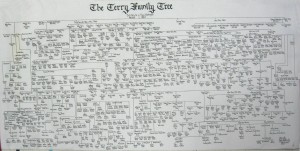
Terry Family Tree
Tags:Aggy Washington Terry, August 8th, Dick Terry, National Black Arts Festival, Slave Cabin, Slave Cemetery, Terry Family Reunion, Washington family
Posted in Book Tour & Reviews, Current Events, Genealogy & DNA, Interviews, Introduction & Personal, Plantation Life, Research, Uncategorized | Comments Closed
Monday, July 13th, 2009
Check out my article on BlackPast.org. It is an excellent resource for African American history and genealogy.
Tags:African American Resources, From Slavery to Freedom, Genealogy & DNA, George Washington, Mt. Vernon, Plantation Life, Slave cabins, Slave Community, Slave Housing, Slave Life, Slavery to Freedom, Southern Plantations, Tennessee Plantations, Washington family, Wessyngton Plantation
Posted in Book Tour & Reviews, Current Events, Genealogy & DNA, Interviews, Introduction & Personal, Plantation Life, Research | Comments Closed








